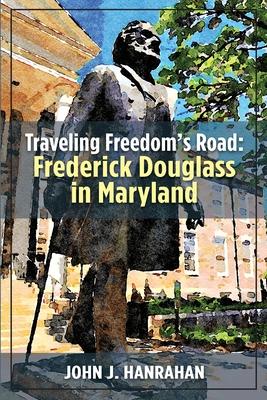How well do Americans know Frederick Douglass?
Posed in the book's first sentence, that question is now asked of you. How well do you know this immensely consequential American? An important goal of this book is to help readers know this heroic figure better by not only offering efficiently built, two-day, self-directed tours of the Eastern Shore and Baltimore but also by relating Douglass's connections to over four dozen recommended stops.
Born Frederick Bailey on Maryland's Eastern Shore in 1818, his first thoughts of escaping his bondage came as a young boy when his home was the Lloyd plantation on the Wye River. Later, as a teenager assigned to work on the farm of William Freeland, his plot to lead a group of enslaved friends to freedom was thwarted, landing him in an Easton jail. Finally, at age twenty, his dreams of freedom were realized when, disguised as a sailor, he boarded a northbound train from the Philadelphia, Wilmington and Baltimore Railroad depot close to the Fell's Point section of Baltimore.
The locations of the former Lloyd plantation, the Freeland farm, and the Easton jail on the Eastern Shore and the erstwhile train depot in Baltimore are all recommended stops pinpointed in this book. So are dozens of other destinations on the Eastern Shore and Baltimore. Each one, in various ways and at different times in Douglass's life, links either directly or indirectly with the great man's life in Maryland.
Not only are travelers, both actual and armchair, guided to each recommended stop, but they are also presented with a relevant reading from either a Douglass autobiography, his powerful oratory, or his bold journalism at each destination. These Douglass Speaks selections connect readers with Douglass's thoughts on the people and places of his life, with several meaningful, often life-changing events he experienced, and with his powerful views on topics ranging from religious hypocrisy to the importance of arming Black soldiers during the Civil War.
A fifteen-page chronology of Douglass's momentous life, from the fact that his family tree in America predates the Revolution to his death in 1895, aids learning about events in Douglass's life falling outside of the Maryland focus of the book. In addition, specific destinations and events covered in the book are identified in the chronology to bring clarity to the sometimes confusing, back-and-forth moves between the Eastern Shore and Baltimore that Frederick's enslaved condition dictated for the young man to undergo.
Richly illustrated and professionally designed and indexed, Traveling Freedom's Road: Frederick Douglass in Maryland, combines the power of place with this important American's inspiring history and powerful words to provide readers the means to know Douglass better.
This is the author's second book in the history/travel genre. Traveling Freedom's Road: A Guide to Exploring Our Civil Rights History, Dr. Hanrahan's first book, was awarded the best travel book and the best African American Culture/History book in two competitions for independently published books.
